Unit 4 A good read知识点总结及练习课件(共98张PPT) 牛津译林版八年级下册
文档属性
| 名称 | Unit 4 A good read知识点总结及练习课件(共98张PPT) 牛津译林版八年级下册 |

|
|
| 格式 | pptx | ||
| 文件大小 | 1.6MB | ||
| 资源类型 | 教案 | ||
| 版本资源 | 牛津译林版 | ||
| 科目 | 英语 | ||
| 更新时间 | 2024-05-16 16:49:18 | ||
图片预览

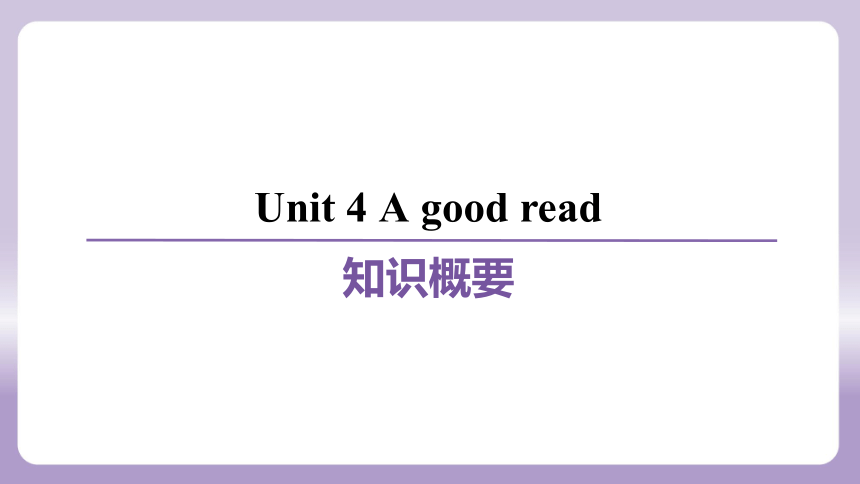
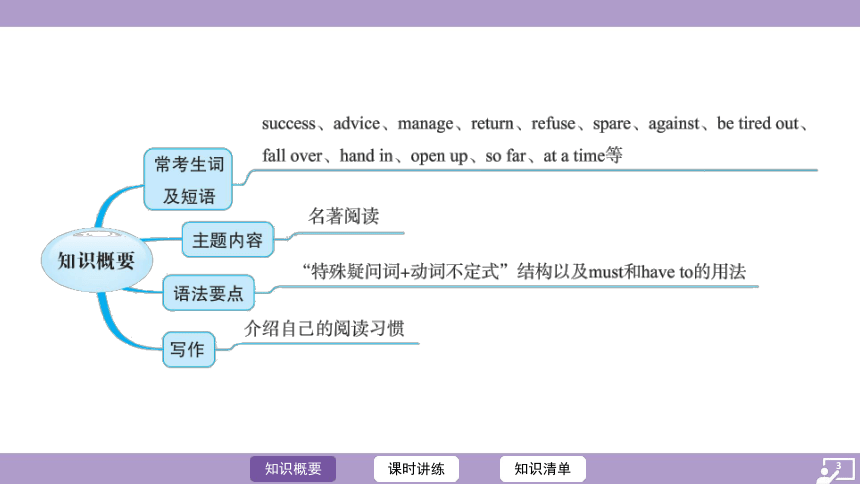
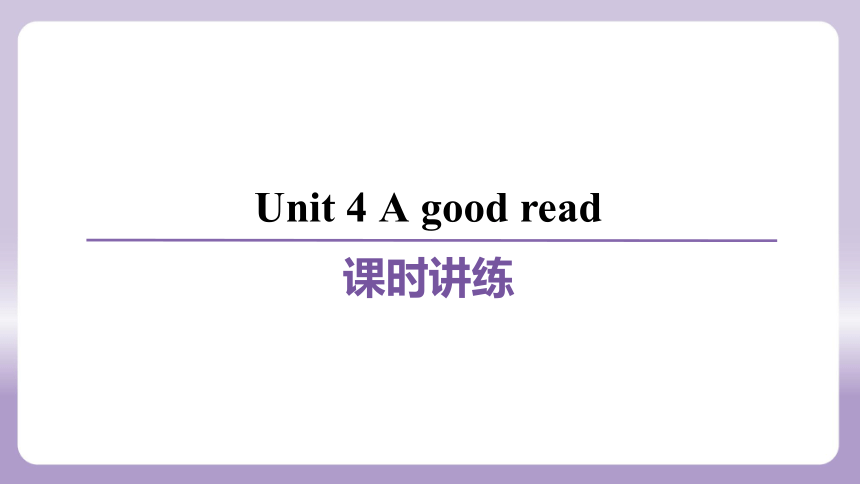
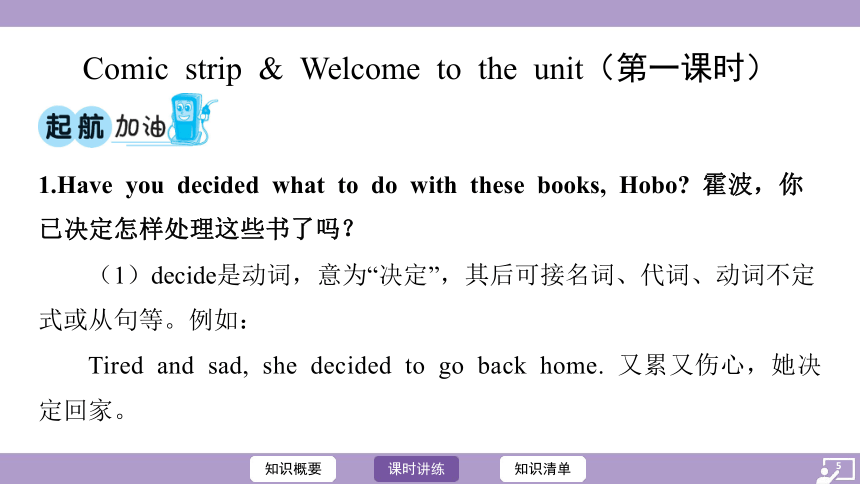
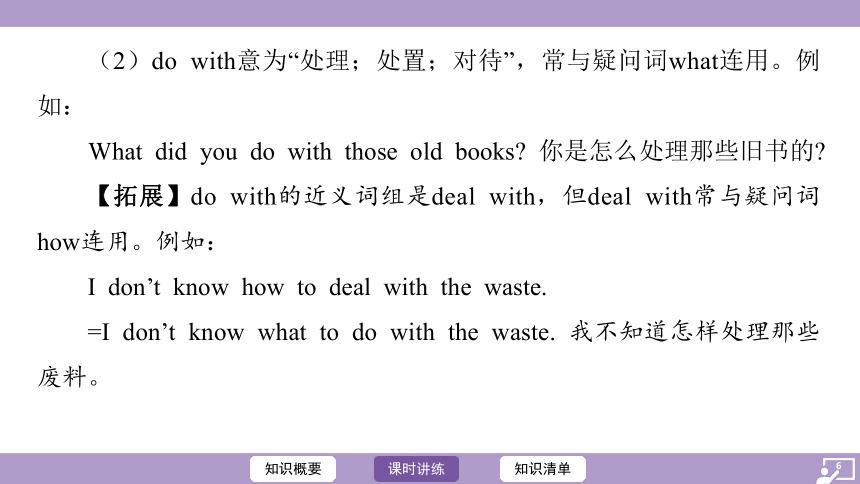
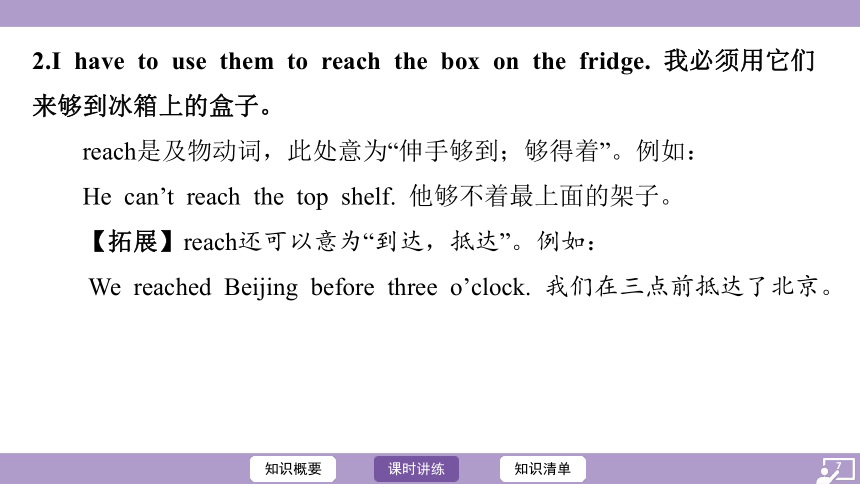
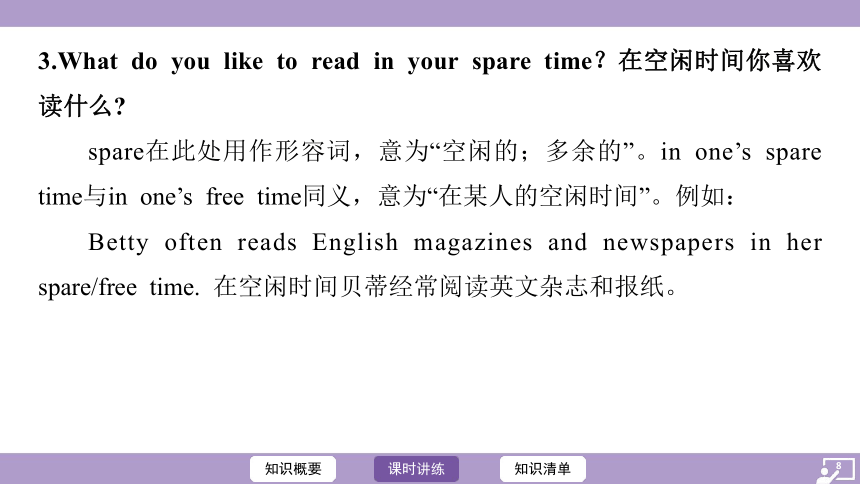
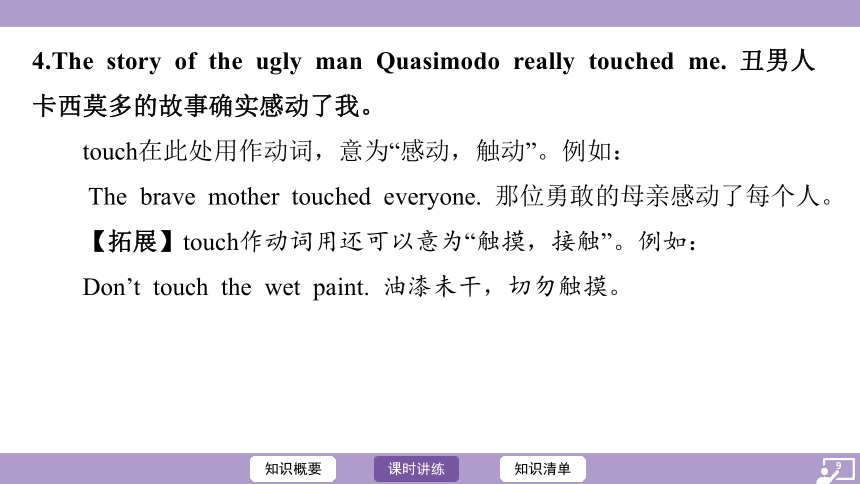

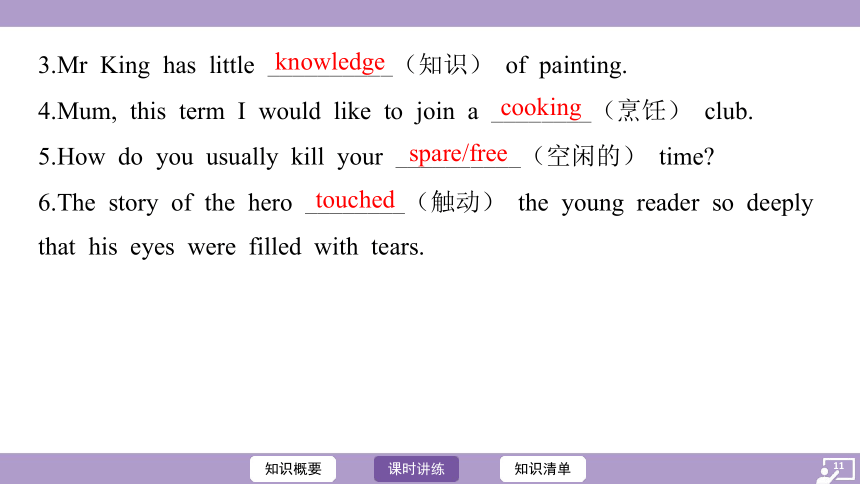
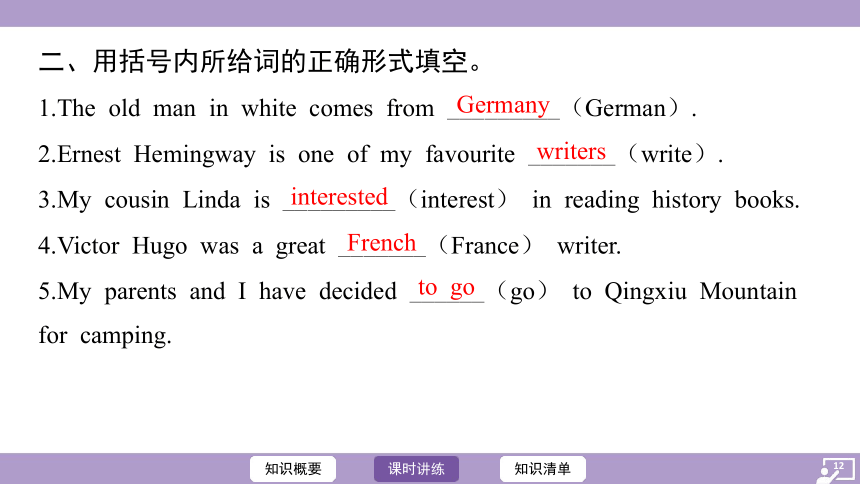
文档简介
(共98张PPT)
Unit 4 A good read
Unit 4 A good read
知识概要
Unit 4 A good read
课时讲练
Comic strip & Welcome to the unit(第一课时)
1.Have you decided what to do with these books, Hobo 霍波,你
已决定怎样处理这些书了吗?
(1)decide是动词,意为“决定”,其后可接名词、代词、动词不定式或从句等。例如:
Tired and sad, she decided to go back home. 又累又伤心,她决定回家。
(2)do with意为“处理;处置;对待”,常与疑问词what连用。例如:
What did you do with those old books 你是怎么处理那些旧书的
【拓展】do with的近义词组是deal with,但deal with常与疑问词how连用。例如:
I don’t know how to deal with the waste.
=I don’t know what to do with the waste. 我不知道怎样处理那些废料。
2.I have to use them to reach the box on the fridge. 我必须用它们来够到冰箱上的盒子。
reach是及物动词,此处意为“伸手够到;够得着”。例如:
He can’t reach the top shelf. 他够不着最上面的架子。
【拓展】reach还可以意为“到达,抵达”。例如:
We reached Beijing before three o’clock. 我们在三点前抵达了北京。
3.What do you like to read in your spare time?在空闲时间你喜欢读什么
spare在此处用作形容词,意为“空闲的;多余的”。in one’s spare time与in one’s free time同义,意为“在某人的空闲时间”。例如:
Betty often reads English magazines and newspapers in her spare/free time. 在空闲时间贝蒂经常阅读英文杂志和报纸。
4.The story of the ugly man Quasimodo really touched me. 丑男人卡西莫多的故事确实感动了我。
touch在此处用作动词,意为“感动,触动”。例如:
The brave mother touched everyone. 那位勇敢的母亲感动了每个人。
【拓展】touch作动词用还可以意为“触摸,接触”。例如:
Don’t touch the wet paint. 油漆未干,切勿触摸。
一、根据句意和中文提示写出单词。
1.Can you recommend a good _____(读物) to me
2.Jack thinks that lions are very _____(丑陋的), but I don’t think
so.
read
ugly
3.Mr King has little __________(知识) of painting.
4.Mum, this term I would like to join a ________(烹饪) club.
5.How do you usually kill your __________(空闲的) time
6.The story of the hero ________(触动) the young reader so deeply
that his eyes were filled with tears.
knowledge
cooking
spare/free
touched
二、用括号内所给词的正确形式填空。
1.The old man in white comes from _________(German).
2.Ernest Hemingway is one of my favourite _______(write).
3.My cousin Linda is _________(interest) in reading history books.
4.Victor Hugo was a great _______(France) writer.
5.My parents and I have decided ______(go) to Qingxiu Mountain
for camping.
Germany
writers
interested
French
to go
三、单项选择。
( ) 1.The shelf is so high that the little boy can’t ________ the
cup on it.
A
A.reach B.carry C.get to
( ) 2.A Christmas Carol is a famous novel ________ by Charles
Dickens.
B
A.wrote B.written C.was written
( ) 4.—What do you ________ your old clothes
—I usually send them to the people in need.
A
A.do with B.look after C.pick up
( ) 5.—For me, winter is the best season of a year.
—________.
B
A.Good idea B.Me too C.That’s OK
( ) 3.—Your English has ________ a lot, Andy. How do you do that
—By listening to English articles every day.
A.imagined B.invented C.improved
C
Reading(第二、三课时)
1.After our ship crashed against the rocks, I swam as far as I
could. 在我们的船撞到礁石损坏之后,我尽可能地游了很远。
(1)crash在此处用作不及物动词,意为“碰撞;撞击”。例如:
In that accident, a red car crashed into a big tree by the road. 在那次事故中,一辆红色轿车撞上了路边的一棵大树。
(2)against是介词,意为“紧靠;碰,撞;反对”。例如:
The rain beat against the window. 雨点击打着窗户。
(3)as...as sb can意为“尽某人所能地……”,相当于as...as possible。其中,第一个as是副词,其后接形容词或副词的原级。例如:
You should come as early as you can.= You should come as early as possible. 你应该尽早点儿来。
2.By the time I finally felt the land under my feet, I was tired out.
等到我终于感觉到脚下的陆地时,我已筋疲力尽。
(1)by the time意为“到……的时候”,相当于when,引导时间状语从句。例如:
It was dark by the time my mother got back home. 我妈妈回到家时天已经黑了。
(2)be tired out意为“筋疲力尽”。例如:
When Jane and Emma got to the top of the mountain, they were tired out. 当简和艾玛到达山顶时,她们感到筋疲力尽了。
3.It moved up over my stomach and neck until it was standing near my face. 它向上爬过我的腹部和脖子,直到站在我的脸附近。
until在此处用作连词,意为“直到……为止”,主要用法如下:
(1)主句若是肯定句,则主句的谓语动词要用延续性动词,表示主句的动作一直持续到until从句所表示的动作发生为止。例如:
I will wait until I hear from you. 我会一直等,直到收到你的来信。
(2)主句若是否定句,构成“not...until...”,意为“直到……才……”。此时主句的动词通常是非延续性动词,表示主句的动作一直到until从句所表示的动作发生时才发生。例如:
Tina didn’t stop to relax until she finished her work. 蒂娜直到完成工作了才停下来休息。
【拓展】until也可以用作介词,意为“直到……为止”。例如:
They didn’t arrive until 11 o’clock last night. 他们直到昨晚十一点钟才到。
4.He was the same size as my little finger!
他不过与我小手指一样大!
the same...as意为“与……一样……”,the same后接名词。the same size as意为“和……一样尺寸”,其意思相当于as big as。例如:
Your shirt is the same colour as mine. 你的衬衫和我的颜色相同。
5.I shouted at them-the loud noise made them all fall over. 我朝他
们吼叫——很大的声音使得他们都倒了下去。
(1)shout at sb意为“冲某人大喊大叫”,表示近距离地对某人大喊大叫(发脾气),态度不友好。例如:
Don’t shout at others. It’s impolite. 不要冲别人大喊大叫,这是不礼貌的。
【拓展】shout to sb意为“向……叫喊”,表示远距离地朝着某人喊(以使对方听见),不含生气等情感因素。例如:
I heard someone shout to me in the distance. 我听见有人在远处叫我。
(2)fall over在此处意为“摔倒”。此外,fall over还可意为“被某人/某物绊倒”。例如:
I rushed for the door and fell over the cat. 我冲向门口,被猫绊了一跤。
6.However, they soon got up again and continued moving across my body. 然而,他们很快又爬了起来,继续在我的身上走动。
continue意为“继续”,既可作及物动词,也可作不及物动词。用作及物动词时,后可接名词、动词-ing或动词不定式。例如:
Mark will continue his education in the UK. 马克将在英国继续求学。
【辨析】continue doing sth与continue to do sth
(1)continue doing sth表示继续做刚才没做完的那件事。例如:
Jenny looked up for a moment, then continued drawing. 珍妮抬头看了一会儿,然后继续画画。
(2)continue to do sth通常表示做完一件事继续做另一件事。例如:
After Tom finished reading a novel, he continued to watch a film with his friends. 汤姆读完小说后继续跟朋友们看电影。
7.I tried to pull one hand free and finally managed to break the rope. 我试着挣脱一只手,最终设法弄断了绳子。
manage在此处用作动词,意为“设法”。
【辨析】try to do sth与manage to do sth
try to do sth 意为“努力/尽力做某事”,侧重为达到目的而努
力;强调过程,结果不一定成功
manage to do sth 意为“设法做成某事”,强调通过努力实现了目的
例如:
I tried to solve the maths problem, but I failed.
我尽力解答这道数学题,但我失败了。
We managed to get to the airport in time.
我们设法及时赶到了机场。
一、根据句意和中文提示写出单词。
1.I noticed that Alice wore a ring on her little _______(手指) on
the right.
2.It’s impossible for them to _________(继续) their work because of
the bad weather.
finger
continue
3.My ________(胃) began to hurt in the morning.
stomach
4.—Can you ____(举起) the heavy box with only one hand
—No, I can’t.
lift
5.Dad asked you to put the table there, _______(紧靠) the wall.
6.You should ____(绑) your dog to a tree because it may hurt someone.
against
tie
7.Jim doesn’t like grapes and his sister doesn’t like them ______(也).
8.My cousin has served as a soldier in the ______(军队) since 2018.
9.When I was young, my father often put me on his _________(肩膀).
10.There is a _____(极小的) hole in this jacket.
either
army
shoulders
tiny
二、用括号内所给词的正确形式填空。
1.Mum, I’m _______(able) to open the door of my room. Can you
give me a hand
2.Yesterday, we all managed _______(buy) the tickets to the concert.
3.Look, the girl is ______(tie) her magazines with string.
4.When Lisa stood up, her desk ____(fall) over and hit Mary in the
front row.
unable
to buy
tying
fell
5.I ______(wake) up at 8:00 this morning, so I was late.
6.She felt __________(anything) wrong with her right leg. It
couldn’t move.
7.Linda heard a loud knock on the door as she ____________(read)
a novel in her study.
woke
something
was reading
三、单项选择。
( ) 1.The workers were ________ out after two hours’ work
without a rest.
A
A.tired B.glad C.ready
( ) 2.There are flowers, trees and grass all ________ the park.
C
A.through B.across C.over
( ) 3.________ Mike told us, we didn’t know how serious the
traffic accident was.
C
A.Since B.After C.Until
( ) 4.—Four hundred yuan for such a T-shirt! You ________ be
joking!
—It’s a little expensive because it is made of silk.
A
A.must B.can C.should
( ) 5.—Keep quiet, John. I need a quiet environment when I’m
working.
—Sorry, Mum. I won’t make any ________ again.
B
A.voice B.noise C.pollution
( ) 6.Tony, don’t ________ your classmates. Doing it like that is
not friendly.
A
A.shout at B.help with C.worry about
( ) 7.Now the only thing we can do is to continue ________ and
try to get out of the forest before the rain falls.
B
A.walk B.walking C.to walking
四、根据汉语意思完成英语句子。每空一词。
1.当感觉楼板摇晃起来时,我们尽可能快地跑出大楼。
When we felt the floor shaking, we ran out of the building ___ _____
___ ____ ______.
as
fast
as
we
could
2.我家后面的小公园有一个足球场那么大。
The small park behind my home is ____ ______ _____ ___ a football
field.
the
same
size
as
4.当我往下看的时候,看到一大群蚂蚁正穿过这条小道。
When I _______ ______, I saw a huge ______ ___ ants crossing the
path.
looked
down
army
of
5.几年之后,他们登上了一艘船,逃离了那个荒岛。
After a few years, they got on a ship and ____ ______ ______ the
desert island.
got
away
from
3.在大雪中我看不清路面,车撞上了前面的一块大石头。
I couldn’t see clearly in the heavy snow and my car ________
___________ a big stone in ______.
crashed
against/into
front
五、根据语篇内容,从方框中选择恰当的单词,并用其正确形式填
空。每个单词只能用一次。
when you understand anywhere as on skill a easy first
Reading books is a good hobby for all kinds of reasons. 1. ., reading books is fun. You can always keep 2. . happy if you like reading. This is especially useful 3. . the weather is bad. It is a relaxing hobby too. You can really become lost in a book.
First
yourself
when
Next, you can read a book almost 4. .: in a car, in a waiting room, 5. . the plane, in bed—even in the bath. All you need is a book! Reading is 6. . convenient hobby as it is easy to stop and then to start again.
anywhere
on
a
when you understand anywhere as on skill a easy first
Another good reason for reading books is that it is useful. If you keep reading 7. . a hobby, you will get better and better at it. This means that you will read faster and become better at 8. . what you read. As your reading 9. . improves, you will probably find that your schoolwork becomes much 10. .. Many school subjects depend on good reading. And as you read, you will learn more and more.
as
understanding
skill
easier
when you understand anywhere as on skill a easy first
六、阅读理解。
When we talk about reading, we probably think of eyes, because we do the reading by eyes. But we can do some reading by ears too. And with the development of smart phones, it’s getting easier and easier to do some reading by ears—by listening to news, novels and so on. This is audio reading. We can do audio reading in many places.
Many people like doing audio reading in bed, before going to sleep. They like to just lie in bed in the darkness before they fall
asleep. This would be the perfect time to do some audio reading. If you read an ordinary(普通的) book, the lights have to be turned on and you have to turn the pages with your hand.
Some people would like to do audio reading in the kitchen. For some of them, it’s boring to cook. So they can enjoy their time by listening to news or stories. For some others, it’s interesting to cook by listening to instructions made by famous cooks.
Audio reading is a favourite while a person is exercising. It allows the mind to be free while the legs, body and arms are kept
busy. But be careful. Don’t make yourself and others in danger. Let’s take driving for example. If you pay much attention to listening, you can’t be a good driver.
Finally, audio reading is helpful for blind people. It’s difficult for them to do reading in the past. But now they can do some audio reading easily.
根据语篇内容,选择最佳选项。
( ) 1.The second paragraph mainly tells us that ________.
B
A.a lot of people do audio reading while sleeping
B.it is much easier to do audio reading
C.you should do audio reading with the light on
( ) 2.People like doing some audio reading in the kitchen because
________.
B
A.they like reading books
B.they feel bored while cooking
C.they are not in a hurry
( ) 3.According to the passage, it’s not good to do audio reading
when we’re ________.
C
A.sleeping B.cooking C.driving
( ) 4.Which of the following is NOT true according to the
passage
A
A.Audio reading means reading by eyes.
B.Audio reading helps you cook a nice dish.
C.Audio reading helps blind people a lot.
( ) 5.Which is the best title for this passage
B
A.A good read
B.Audio reading
C.Be careful while reading
Grammar(第四课时)
1.疑问词+动词不定式
动词不定式常与疑问代词what、which、who和疑问副词when、where、how等连用,构成“疑问词+to do”结构。该结构在句中可作主语、表语、宾语等多种句子成分。
(1)作主语。作主语时,谓语动词用单数形式。例如:
When to have the meeting is a question.什么时候开会是个问题。
(2)作表语。例如:
The question is how to get there in such a short time. 问题是如何在如此短的时间内到达那儿。
(3)作宾语。常放在know、learn、decide、tell、remember、explain、find out等词后面。例如:
I can’t decide what to wear. 我拿不定主意穿什么。
【拓展】(1)“疑问词+动词不定式”结构也可以放在advise、ask、show、teach、tell等词后面作双宾语中的直接宾语。例如:
I want to ask him how to make a kite. 我想问他如何制作风筝。
(2)“疑问词+动词不定式”结构可以改写成由该疑问词引导的从句,从而把简单句改为复合句,其意义不变。例如:
I don’t know where to go.=I don’t know where I should go. 我不知道应该去哪里。
2.must和have to的用法
(1)must是情态动词,意为“必须”,侧重于说话者的主观看法,认为有必要去做某事。must没有人称、时态和数的变化。must的否定式mustn’t意为“不准,禁止”。例如:
You must go to the hospital today. 今天你必须去医院。
Look at the sign. You mustn’t smoke here. 看这个标志,这里禁止吸烟。
(2)have to意为“必须,不得不”,后接动词原形,表示客观上的必须。have to的否定式don’t have to意为“不必,不需要”,相当于needn’t。例如:
The last bus has gone. We’ll have to walk home. 最后一班车已经开走了。我们不得不走路回家。
We don’t have to get up early tomorrow morning. 明天早上我们不必早起。
【拓展】回答以must引导的一般疑问句时,若是否定答复,不可以用mustn’t,而需要用needn’t或don’t have to。例如:
—Must I water the flowers 我今天必须给花儿浇水吗?
—Yes, you must./ No, you needn’t. 是的,你必须。/不,你不必。
3.Mr Wu advised us which to choose as after-school activities. 吴老师建议我们选择哪些活动作为课外活动。
advise是及物动词,意为“建议,劝告”,后面常跟名词、代词、动名词或宾语从句等作宾语。常见固定搭配advise sb (not) to do sth意为“建议某人(不)做某事”。例如:
I advise waiting another ten minutes. 我建议再等十分钟。
We advise parents not to leave their children at home alone. 我们建议父母不要将他们的孩子单独留在家里。
4.The students asked their teacher when to hand in their work. 学生们问他们的老师什么时候交作业。
hand in意为“上交,递交”,是“动词+副词”型短语。若名词作宾语,名词放在两者之间或之后均可;若代词作宾语,代词要放在两者之间。
例如:
She asked her students to hand in their homework through a QR code. 她让学生通过二维码交作业。
We saw a little girl pick up a wallet and hand it in to the police this afternoon. 今天下午我们看到一个小女孩捡起一个钱包,并且把它交给了警察。
一、根据句意和中文提示写出单词。
1.Before watching a film, I usually read some ________(评论)
about it.
2.Simon hasn’t ________(归还) my bike to me yet. He borrowed it
two days ago.
reviews
returned
3.If you want to keep the book for another week, you have to
_______(续借) it.
4.Can you tell me when to ______(递,交) in our book report
5.Our Chinese teacher has _____________(推荐) so many interesting
books to us.
renew
hand
recommended
二、用括号内所给词的正确形式填空。
1.Jenny hasn’t decided which present __________(choose) for her
sister.
2.By the way, do you know how _______(pay) for things online
3.You must not ____(get) off until the bus stops.
4.Lisa is not sure who _______(ask) for advice.
5.We don’t have to ____(go) to school at the weekend.
6.The doctor advised me ________(take) more exercise.
to choose
to pay
get
to ask
go
to take
三、单项选择。
( ) 1.All the cars ________ stop when the traffic lights turn red.
A
A.must B.may C.can
( ) 2.It gets dark. I ________ go back home or my mother will
worry about me.
A
A.have to B.can C.may
( ) 3.—Must I answer this question in English
—No, you ________.
B
A.mustn’t B.needn’t C.can’t
( ) 4.Alice has a strong sense of time and always shows up
________.
B
A.every time B.on time C.at times
( ) 5.If you don’t know ________ at the party, I think you can
choose fashion or hobbies as a topic.
B
A.who to talk with B.what to talk about C.where to talk
( ) 6.This morning, a cleaner found a nice watch near a rubbish
bin. She then ________ to the police.
A
A.handed it in B.put it up C.gave it back
四、按要求完成句子,每空一词。
1.Can you tell me how we’ll celebrate the May Day holiday
(改为同义句)
Can you tell me _____ ___ _________ the May Day holiday
how
to
celebrate
2.Jim has to go to school on foot every day. (改为否定句)
Jim ________ _____ ___ go to school on foot every day.
doesn’t
have
to
3.I think Harry Potter series are very interesting. (对画线部分提问)
______ ____ _____ ______ ___ Harry Potter series
What
do
you
think
of
4.Must I stay at home today (作否定回答)
No, you ______ _____ ___.
don’t
have
to
5.Amy’s father went to bed after Amy came back home last night.
(改为同义句)
Amy’s father ______ go to bed _____ Amy came back home last
night.
didn’t
until
Integrated skills & Study skills(第五课时)
1.All the British publishing houses refused to publish it. 所有的英国出版社都拒绝出版它。
refuse在此处用作及物动词,意为“拒绝,回绝”,其常见用法如下:
(1)“refuse+名词/代词”意为“拒绝……”。例如:
I politely refused their invitation. 我礼貌地回绝了他们的邀请。
(2)refuse to do sth意为“拒绝做某事”。例如:
He refused to attend the meeting. 他拒绝参加这次会议。
2.so far 到目前为止
so far意为“到目前为止”,与up to now同义,指从过去某一时刻开始一直到现在这一段时间。其常与现在完成时连用,多用于句首或句末。例如:
So far they have visited more than ten Asian countries. 到目前为止,他们已经参观了十多个亚洲国家。
3.a great success 巨大的成功
success在此处用作可数名词,意为“成功的人(或事物)”。例如:
The party was a big success. 这次聚会很成功。
4.has been translated into about 70 languages
已被译成大约70种语言
translate用作及物动词,意为“翻译”。translate...into...意为“把……翻译成……”。例如:
Jim Green is a famous translator. Last week, he translated a poem into German. 吉姆·格林是位著名的翻译家。上周他把一首诗歌翻译成德语。
5.The first Harry Potter book was a great success in the very
beginning. 第一本哈利·波特书一开始就取得巨大的成功。
(1)very在此处用作形容词,意为“正是的,恰好的”,仅用于名词前,其前常有the、this、that或形容词性物主代词等,用以加强语气。例如:
He is phoning her at this very moment. 他这会儿正在给她打电话。
(2)in the very beginning意为“在刚开始,一开始”,in the beginning则意为“开始,起初”。例如:
I became interested in English in the very beginning. 我一开始就对英语感兴趣了。
6.内容之间的过渡
我们在写一篇文章时,会用不同的方法来连接里面的内容。常用的连接词和短语以及它们的作用如下:
Usage(用处) Transitional words and phrases(连接词和短语)
说明时间 before, after, when, at first ...
说明顺序 first, second, next, then ...
增加更多信息 and, also, too, and then ...
举例 for example ...
说明原因和结果 because, since, as, so...
强调 never, in fact ...
比较或对照 but, however, while, otherwise...
7.I also want to travel and have exciting experiences in the future. 将来我也想去旅行并有令人兴奋的经历。
experience在此处用作可数名词,意为“经历”。例如:
It was an experience I will never forget.
那是我永远都忘不掉的经历。
【拓展】experience还可用作不可数名词,意为“经验”。表示做某事的经验时,其后通常接in/of doing sth。例如:
He has lots of experience in teaching. 他有丰富的教学经验。
一、根据句意和中文提示写出单词。
1.With your help, I believe this play will make a great ________
(成功).
2.I never thought he would _______(拒绝) my invitation.
3.Can you help me ________(翻译) this Chinese article into English
4.Mrs White asked me to buy two _______(份) of China Daily for
her.
success
refuse
translate
copies
5.Who knows that _________(加拿大的) girl in a red coat
Canadian
6.—I don’t know what to do in my spare time.
—How about reading a ______(系列) of Harry Potter books
series
7.My uncle can ____(航行) very well.
8.In the last letter, Sam told me many of his hobbies and
___________(经历) in the past.
sail
experiences
二、用括号内所给词的正确形式填空。
1.The ______(sell) of the newspaper were up by 20% last year.
2.She was a little afraid in the very __________(begin).
3.It is a famous British __________(publish) house.
4.We get __________(know) not only from books but also from our
daily life.
sales
beginning
publishing
knowledge
5.It is said that many people are looking for the _______(hide)
treasure.
6.Mr Li refuses ________(send) his children to the weekend training
for extra classes.
7.John is a young man full of __________(confident).
hidden
to send
confidence
三、单项选择。
( ) 1.A good way to finish a difficult task is doing one thing
________.
B
A.at times B.at a time C.at all times
( ) 2.—Must I wash my clothes at once, Mum
—No, you ________. You ________ wash them before 5 p.m.
A
A.needn’t; may B.needn’t; need C.mustn’t; may
( ) 3.________, we have raised 15,000 yuan for the poor kids.
B
A.Last year B.So far C.At the moment
( ) 4.Jim is always careless while doing his homework. ________,
he makes lots of mistakes.
C
A.As for B.In a word C.As a result
( ) 5.—Let’s hold a book fair(书展) to exchange books during
the Reading Week.
—________. I can bring the whole set of Lao She’s books.
C
A.Never mind B.That’s all right C.Good idea
四、根据对话内容,从下面的方框中选出恰当的句子补全对话。有
一个选项是多余的。
A: Hi, Linda! What are you doing
B: I am reading a book called Black Beauty.
A. That sounds interesting.
B. It’s my pleasure.
C. I want some history books.
D. But I have never read it.
E. You must return it on time.
F. Is it a novel or a history book
A: _1.(__)___
B: It is a novel. It is about the story of a black horse.
F
A. That sounds interesting.
B. It’s my pleasure.
C. I want some history books.
D. But I have never read it.
E. You must return it on time.
F. Is it a novel or a history book
A: I heard about it. _2.(__)___
B: It is well worth reading. It describes the world and all kinds of people in the horse’s eyes.
D
A: _3.(__)___ Could you please tell me where to find the book
B: In our school library. There are still several copies there.
A: That is great. Do you know how long I can keep the book
A
A. That sounds interesting.
B. It’s my pleasure.
C. I want some history books.
D. But I have never read it.
E. You must return it on time.
F. Is it a novel or a history book
B: For two weeks. _4.(__)___
A: Thanks for your help.
B: _5.(__)___
E
B
A. That sounds interesting.
B. It’s my pleasure.
C. I want some history books.
D. But I have never read it.
E. You must return it on time.
F. Is it a novel or a history book
Task & Self-assessment(第六课时)
1.Who do you usually ask for advice on books 你通常向谁征求读书的建议?
ask for advice意为“征求意见”。其中的advice是不可数名词,意为“建议,忠告,劝告”。表示“一条建议”用a/one piece of advice;表示“一些建议”用some advice。例如:
I often ask Mr White for advice on writing. 我经常向怀特先生征求有关写作的建议。
【拓展】advice的动词形式是advise,常见搭配advise sb to do sth意为“建议某人去做某事”。例如:
I advised them to go to the museum by underground. 我建议他们搭地铁去博物馆。
2....it is just opposite my home. ……它就在我家的对面。
opposite在此处用作介词,意为“在……对面,与……相反”,相当于across from。例如:
They live just opposite the park. 他们就住在公园的对面。
3.They also open up a whole new world to me. 它们还向我打开了一整个新世界。
open up意为“开启;开创;开辟;开张等”。例如:
A new Thai restaurant opened up in the town last week. 上周镇上有一家新的泰国餐馆开张了。
一、根据句意和中文提示写出单词。
1.My grandparents’ eating ______(习惯) are very healthy.
2.Do you like ________(古典的) music
habits
classical
3.There is a very tall building ________(在……对面) the railway
station.
4.Alice is interested in history books, but she likes _______(小说)
best.
5.Good books help me relax and also open up a whole new ______
(世界) to me.
opposite
novels
world
二、用括号内所给词的正确形式填空。
1.Betty spends more than ten hours a week reading different ______
(type) of books.
2.The woman with short hair is the ________(library) of our school.
3.I don’t think children should refuse ______(do) housework.
types
librarian
to do
4.The teacher gave us some _______(advise) on which TV show to
watch.
5.Look, some __________(Canada) are singing and dancing over
there.
6.The capital of _________(German) is Berlin. And it’s a big and
beautiful city.
advice
Canadians
Germany
三、单项选择。
( ) 1.—Do you know the book Educated: A Memoir written by
Tara Westover
—Yes. I have read the ________ online and most say it’s a
good one.
B
A.results B.reviews C.records
( ) 2.—Excuse me. Could you please tell me ________ to park
my car
—Sure. There is a parking lot over there, behind the restaurant.
B
A.how B.where C.what
( ) 3.Zhang Guimei works hard to ________ a new situation for
the girls in the mountains.
B
A.look up B.open up C.turn up
( ) 4.I often make a note of the main points of my speech.
________ I may forget some of them while speaking.
A
A.Otherwise B.However C.Moreover
( ) 5.The wind was very strong and the ship sailed very slowly
________ the wind.
B
A.for B.against C.down
( ) 6.—Your bag looks heavy. Do you need a hand
—________. Thanks all the same.
C
A.My pleasure B.Yes, please C.I can manage it
四、根据语篇内容,从方框中选择恰当的单词,并用其正确形式填
空。每个单词只能用一次。
after return because go stay speak are know easy but
Marco Polo was the most famous Westerner to visit Asia during the Middle Ages. Born in Venice in 1254, Marco 1. . on a trip with his father and uncle to Asia at the age of 17. Today people can
2. . travel to different places around the world. 3. . it was
very difficult for people from the West to visit the East then.
went
easily
But
4. . three and a half years’ travel, the Polos reached China. During his 5. ., Marco Polo worked for Kublai Khan, the emperor(皇帝) of China. He learned many things that were different from Europeans’. In his diary, he wrote, “The roads of the new capital, Dadu, 6. . so straight and so wide.” Paper money also made him surprised, 7. . it was not yet in use in the West at that time. He also learned to 8. . Chinese.
After
stay
after return because go stay speak are know easy but
are
because
speak
Before he turned thirty, he was even made a Chinese official. In 1295, Marco and his family finally 9. . to Venice. Then a book about his trip, full of facts, was completed. It is 10. . as The Travels of Marco Polo. From it, we can sill have a look at the fantastic trip hundreds of years ago.
returned
known
after return because go stay speak are know easy but
五、书面表达。
假设你们学校向全校同学发出“读好书,促成长”的倡议,请你根据
以下信息提示用英1文写一份倡议书。
读书的意义 获取知识,开阔视野,有助于学习和成长
现状 有的学生只对听音乐感兴趣,有的学生看电视和玩游戏
占去了大部分时间
倡议 ……
要求:
1.倡议书必须包含所有的提示要点,可适当发挥;
2.80词左右,开头和结尾已经给出,不计入总词数。
Dear friends,
Reading is very important in our life._________________________
______________________________________________________________
______________________________________________________________
______________________________________________________________
______________________________________________________________
We can get knowledge
through reading. It can not only open our minds, but also make us
cleverer and happier. Our study can be improved if we read more
good books. The more we read, the more we learn, and the brighter
our future will become.
______________________________________________________________
______________________________________________________________
______________________________________________________________
______________________________________________________________
______________________________________________________________
Let’s start reading now! And let it become a part of our life!
However, some students spend much time in listening to music,
watching TV or going online to play games. It takes much of their
spare time. So I would like to suggest that everyone should read more
books, especially Chinese classics so that we can spread our traditional
Chinese culture to the world.
Unit 4 A good read
知识清单
重点短语
1._________________处理
do with/deal with
2.______________________在某人的空闲时间
in one’s spare/free time
3.______________法国作家
French writer
4.____________到……时候为止
by the time
5.______________撞击到……
crash against
6._______________尽可能地远
as far as sb can
7._____________筋疲力尽
be tired out
8.___________低头看
look down
9.___________被拴到……上
be tied to
16. ____________上交,递交
10.________________与……一样……
the same... as...
11.__________跌倒
fall over
12.__________________继续做某事
continue doing sth
13._________________设法做成某事
manage to do sth
14._______________一大群……
a huge army of
15.___________________________(从……)逃走
run/get away (from...)
hand in
17.___________等等
and so on
18.________________拒绝做某事
refuse to do sth
19.________到目前为止
so far
20._______________很大的成功
a great success
21.________________把……翻译成……
translate... into...
22.__________每次
at a time
23.__________开启,开创,开辟
open up
重点句型
1.________________________________________你已决定怎样处理这些书了吗?
Have you decided what to do with these books
2._________________________________________我得用它们来够冰箱上面的盒子。
I have to use them to reach the box on the fridge.
3.____________________________我醒来时,太阳正从东方升起。
I woke up as the sun was rising.
4.__________________________________他和我的小手指一样大!
He was the same size as my little finger!
5._______________________________________________________我试着挣脱一只手,最终设法弄断了绳子。
I tried to pull one hand free and finally managed to break the ropes.
6._________________________________格列佛发现自己无法动弹。
Gulliver found himself unable to move.
7.____________________________________________丹尼尔自学怎样用电脑绘图。
Daniel taught himself how to use a computer to draw.
8.______________________________在图书馆,你必须保持安静。
You must keep quiet in the library.
9.__________________________________________我们经常聚在一起讨论读什么。
We often meet together and discuss what to read.
10.______________________________________它们还向我开启了一整个新世界。
They also open up a whole new world to me.
重点语法
1. 疑问词+动词不定式
动词不定式常与疑问代词what、which、who和疑问副词when、where、how等连用,构成“疑问词+to do”结构。
2. must和have to的用法
(1)must是情态动词,没有人称、时态和数的变化;否定式mustn’t意
为“不准,禁止”。
(2)have to后接动词原形;have to的否定式don’t have to意为
“不必,不需要”。
Unit 4 A good read
Unit 4 A good read
知识概要
Unit 4 A good read
课时讲练
Comic strip & Welcome to the unit(第一课时)
1.Have you decided what to do with these books, Hobo 霍波,你
已决定怎样处理这些书了吗?
(1)decide是动词,意为“决定”,其后可接名词、代词、动词不定式或从句等。例如:
Tired and sad, she decided to go back home. 又累又伤心,她决定回家。
(2)do with意为“处理;处置;对待”,常与疑问词what连用。例如:
What did you do with those old books 你是怎么处理那些旧书的
【拓展】do with的近义词组是deal with,但deal with常与疑问词how连用。例如:
I don’t know how to deal with the waste.
=I don’t know what to do with the waste. 我不知道怎样处理那些废料。
2.I have to use them to reach the box on the fridge. 我必须用它们来够到冰箱上的盒子。
reach是及物动词,此处意为“伸手够到;够得着”。例如:
He can’t reach the top shelf. 他够不着最上面的架子。
【拓展】reach还可以意为“到达,抵达”。例如:
We reached Beijing before three o’clock. 我们在三点前抵达了北京。
3.What do you like to read in your spare time?在空闲时间你喜欢读什么
spare在此处用作形容词,意为“空闲的;多余的”。in one’s spare time与in one’s free time同义,意为“在某人的空闲时间”。例如:
Betty often reads English magazines and newspapers in her spare/free time. 在空闲时间贝蒂经常阅读英文杂志和报纸。
4.The story of the ugly man Quasimodo really touched me. 丑男人卡西莫多的故事确实感动了我。
touch在此处用作动词,意为“感动,触动”。例如:
The brave mother touched everyone. 那位勇敢的母亲感动了每个人。
【拓展】touch作动词用还可以意为“触摸,接触”。例如:
Don’t touch the wet paint. 油漆未干,切勿触摸。
一、根据句意和中文提示写出单词。
1.Can you recommend a good _____(读物) to me
2.Jack thinks that lions are very _____(丑陋的), but I don’t think
so.
read
ugly
3.Mr King has little __________(知识) of painting.
4.Mum, this term I would like to join a ________(烹饪) club.
5.How do you usually kill your __________(空闲的) time
6.The story of the hero ________(触动) the young reader so deeply
that his eyes were filled with tears.
knowledge
cooking
spare/free
touched
二、用括号内所给词的正确形式填空。
1.The old man in white comes from _________(German).
2.Ernest Hemingway is one of my favourite _______(write).
3.My cousin Linda is _________(interest) in reading history books.
4.Victor Hugo was a great _______(France) writer.
5.My parents and I have decided ______(go) to Qingxiu Mountain
for camping.
Germany
writers
interested
French
to go
三、单项选择。
( ) 1.The shelf is so high that the little boy can’t ________ the
cup on it.
A
A.reach B.carry C.get to
( ) 2.A Christmas Carol is a famous novel ________ by Charles
Dickens.
B
A.wrote B.written C.was written
( ) 4.—What do you ________ your old clothes
—I usually send them to the people in need.
A
A.do with B.look after C.pick up
( ) 5.—For me, winter is the best season of a year.
—________.
B
A.Good idea B.Me too C.That’s OK
( ) 3.—Your English has ________ a lot, Andy. How do you do that
—By listening to English articles every day.
A.imagined B.invented C.improved
C
Reading(第二、三课时)
1.After our ship crashed against the rocks, I swam as far as I
could. 在我们的船撞到礁石损坏之后,我尽可能地游了很远。
(1)crash在此处用作不及物动词,意为“碰撞;撞击”。例如:
In that accident, a red car crashed into a big tree by the road. 在那次事故中,一辆红色轿车撞上了路边的一棵大树。
(2)against是介词,意为“紧靠;碰,撞;反对”。例如:
The rain beat against the window. 雨点击打着窗户。
(3)as...as sb can意为“尽某人所能地……”,相当于as...as possible。其中,第一个as是副词,其后接形容词或副词的原级。例如:
You should come as early as you can.= You should come as early as possible. 你应该尽早点儿来。
2.By the time I finally felt the land under my feet, I was tired out.
等到我终于感觉到脚下的陆地时,我已筋疲力尽。
(1)by the time意为“到……的时候”,相当于when,引导时间状语从句。例如:
It was dark by the time my mother got back home. 我妈妈回到家时天已经黑了。
(2)be tired out意为“筋疲力尽”。例如:
When Jane and Emma got to the top of the mountain, they were tired out. 当简和艾玛到达山顶时,她们感到筋疲力尽了。
3.It moved up over my stomach and neck until it was standing near my face. 它向上爬过我的腹部和脖子,直到站在我的脸附近。
until在此处用作连词,意为“直到……为止”,主要用法如下:
(1)主句若是肯定句,则主句的谓语动词要用延续性动词,表示主句的动作一直持续到until从句所表示的动作发生为止。例如:
I will wait until I hear from you. 我会一直等,直到收到你的来信。
(2)主句若是否定句,构成“not...until...”,意为“直到……才……”。此时主句的动词通常是非延续性动词,表示主句的动作一直到until从句所表示的动作发生时才发生。例如:
Tina didn’t stop to relax until she finished her work. 蒂娜直到完成工作了才停下来休息。
【拓展】until也可以用作介词,意为“直到……为止”。例如:
They didn’t arrive until 11 o’clock last night. 他们直到昨晚十一点钟才到。
4.He was the same size as my little finger!
他不过与我小手指一样大!
the same...as意为“与……一样……”,the same后接名词。the same size as意为“和……一样尺寸”,其意思相当于as big as。例如:
Your shirt is the same colour as mine. 你的衬衫和我的颜色相同。
5.I shouted at them-the loud noise made them all fall over. 我朝他
们吼叫——很大的声音使得他们都倒了下去。
(1)shout at sb意为“冲某人大喊大叫”,表示近距离地对某人大喊大叫(发脾气),态度不友好。例如:
Don’t shout at others. It’s impolite. 不要冲别人大喊大叫,这是不礼貌的。
【拓展】shout to sb意为“向……叫喊”,表示远距离地朝着某人喊(以使对方听见),不含生气等情感因素。例如:
I heard someone shout to me in the distance. 我听见有人在远处叫我。
(2)fall over在此处意为“摔倒”。此外,fall over还可意为“被某人/某物绊倒”。例如:
I rushed for the door and fell over the cat. 我冲向门口,被猫绊了一跤。
6.However, they soon got up again and continued moving across my body. 然而,他们很快又爬了起来,继续在我的身上走动。
continue意为“继续”,既可作及物动词,也可作不及物动词。用作及物动词时,后可接名词、动词-ing或动词不定式。例如:
Mark will continue his education in the UK. 马克将在英国继续求学。
【辨析】continue doing sth与continue to do sth
(1)continue doing sth表示继续做刚才没做完的那件事。例如:
Jenny looked up for a moment, then continued drawing. 珍妮抬头看了一会儿,然后继续画画。
(2)continue to do sth通常表示做完一件事继续做另一件事。例如:
After Tom finished reading a novel, he continued to watch a film with his friends. 汤姆读完小说后继续跟朋友们看电影。
7.I tried to pull one hand free and finally managed to break the rope. 我试着挣脱一只手,最终设法弄断了绳子。
manage在此处用作动词,意为“设法”。
【辨析】try to do sth与manage to do sth
try to do sth 意为“努力/尽力做某事”,侧重为达到目的而努
力;强调过程,结果不一定成功
manage to do sth 意为“设法做成某事”,强调通过努力实现了目的
例如:
I tried to solve the maths problem, but I failed.
我尽力解答这道数学题,但我失败了。
We managed to get to the airport in time.
我们设法及时赶到了机场。
一、根据句意和中文提示写出单词。
1.I noticed that Alice wore a ring on her little _______(手指) on
the right.
2.It’s impossible for them to _________(继续) their work because of
the bad weather.
finger
continue
3.My ________(胃) began to hurt in the morning.
stomach
4.—Can you ____(举起) the heavy box with only one hand
—No, I can’t.
lift
5.Dad asked you to put the table there, _______(紧靠) the wall.
6.You should ____(绑) your dog to a tree because it may hurt someone.
against
tie
7.Jim doesn’t like grapes and his sister doesn’t like them ______(也).
8.My cousin has served as a soldier in the ______(军队) since 2018.
9.When I was young, my father often put me on his _________(肩膀).
10.There is a _____(极小的) hole in this jacket.
either
army
shoulders
tiny
二、用括号内所给词的正确形式填空。
1.Mum, I’m _______(able) to open the door of my room. Can you
give me a hand
2.Yesterday, we all managed _______(buy) the tickets to the concert.
3.Look, the girl is ______(tie) her magazines with string.
4.When Lisa stood up, her desk ____(fall) over and hit Mary in the
front row.
unable
to buy
tying
fell
5.I ______(wake) up at 8:00 this morning, so I was late.
6.She felt __________(anything) wrong with her right leg. It
couldn’t move.
7.Linda heard a loud knock on the door as she ____________(read)
a novel in her study.
woke
something
was reading
三、单项选择。
( ) 1.The workers were ________ out after two hours’ work
without a rest.
A
A.tired B.glad C.ready
( ) 2.There are flowers, trees and grass all ________ the park.
C
A.through B.across C.over
( ) 3.________ Mike told us, we didn’t know how serious the
traffic accident was.
C
A.Since B.After C.Until
( ) 4.—Four hundred yuan for such a T-shirt! You ________ be
joking!
—It’s a little expensive because it is made of silk.
A
A.must B.can C.should
( ) 5.—Keep quiet, John. I need a quiet environment when I’m
working.
—Sorry, Mum. I won’t make any ________ again.
B
A.voice B.noise C.pollution
( ) 6.Tony, don’t ________ your classmates. Doing it like that is
not friendly.
A
A.shout at B.help with C.worry about
( ) 7.Now the only thing we can do is to continue ________ and
try to get out of the forest before the rain falls.
B
A.walk B.walking C.to walking
四、根据汉语意思完成英语句子。每空一词。
1.当感觉楼板摇晃起来时,我们尽可能快地跑出大楼。
When we felt the floor shaking, we ran out of the building ___ _____
___ ____ ______.
as
fast
as
we
could
2.我家后面的小公园有一个足球场那么大。
The small park behind my home is ____ ______ _____ ___ a football
field.
the
same
size
as
4.当我往下看的时候,看到一大群蚂蚁正穿过这条小道。
When I _______ ______, I saw a huge ______ ___ ants crossing the
path.
looked
down
army
of
5.几年之后,他们登上了一艘船,逃离了那个荒岛。
After a few years, they got on a ship and ____ ______ ______ the
desert island.
got
away
from
3.在大雪中我看不清路面,车撞上了前面的一块大石头。
I couldn’t see clearly in the heavy snow and my car ________
___________ a big stone in ______.
crashed
against/into
front
五、根据语篇内容,从方框中选择恰当的单词,并用其正确形式填
空。每个单词只能用一次。
when you understand anywhere as on skill a easy first
Reading books is a good hobby for all kinds of reasons. 1. ., reading books is fun. You can always keep 2. . happy if you like reading. This is especially useful 3. . the weather is bad. It is a relaxing hobby too. You can really become lost in a book.
First
yourself
when
Next, you can read a book almost 4. .: in a car, in a waiting room, 5. . the plane, in bed—even in the bath. All you need is a book! Reading is 6. . convenient hobby as it is easy to stop and then to start again.
anywhere
on
a
when you understand anywhere as on skill a easy first
Another good reason for reading books is that it is useful. If you keep reading 7. . a hobby, you will get better and better at it. This means that you will read faster and become better at 8. . what you read. As your reading 9. . improves, you will probably find that your schoolwork becomes much 10. .. Many school subjects depend on good reading. And as you read, you will learn more and more.
as
understanding
skill
easier
when you understand anywhere as on skill a easy first
六、阅读理解。
When we talk about reading, we probably think of eyes, because we do the reading by eyes. But we can do some reading by ears too. And with the development of smart phones, it’s getting easier and easier to do some reading by ears—by listening to news, novels and so on. This is audio reading. We can do audio reading in many places.
Many people like doing audio reading in bed, before going to sleep. They like to just lie in bed in the darkness before they fall
asleep. This would be the perfect time to do some audio reading. If you read an ordinary(普通的) book, the lights have to be turned on and you have to turn the pages with your hand.
Some people would like to do audio reading in the kitchen. For some of them, it’s boring to cook. So they can enjoy their time by listening to news or stories. For some others, it’s interesting to cook by listening to instructions made by famous cooks.
Audio reading is a favourite while a person is exercising. It allows the mind to be free while the legs, body and arms are kept
busy. But be careful. Don’t make yourself and others in danger. Let’s take driving for example. If you pay much attention to listening, you can’t be a good driver.
Finally, audio reading is helpful for blind people. It’s difficult for them to do reading in the past. But now they can do some audio reading easily.
根据语篇内容,选择最佳选项。
( ) 1.The second paragraph mainly tells us that ________.
B
A.a lot of people do audio reading while sleeping
B.it is much easier to do audio reading
C.you should do audio reading with the light on
( ) 2.People like doing some audio reading in the kitchen because
________.
B
A.they like reading books
B.they feel bored while cooking
C.they are not in a hurry
( ) 3.According to the passage, it’s not good to do audio reading
when we’re ________.
C
A.sleeping B.cooking C.driving
( ) 4.Which of the following is NOT true according to the
passage
A
A.Audio reading means reading by eyes.
B.Audio reading helps you cook a nice dish.
C.Audio reading helps blind people a lot.
( ) 5.Which is the best title for this passage
B
A.A good read
B.Audio reading
C.Be careful while reading
Grammar(第四课时)
1.疑问词+动词不定式
动词不定式常与疑问代词what、which、who和疑问副词when、where、how等连用,构成“疑问词+to do”结构。该结构在句中可作主语、表语、宾语等多种句子成分。
(1)作主语。作主语时,谓语动词用单数形式。例如:
When to have the meeting is a question.什么时候开会是个问题。
(2)作表语。例如:
The question is how to get there in such a short time. 问题是如何在如此短的时间内到达那儿。
(3)作宾语。常放在know、learn、decide、tell、remember、explain、find out等词后面。例如:
I can’t decide what to wear. 我拿不定主意穿什么。
【拓展】(1)“疑问词+动词不定式”结构也可以放在advise、ask、show、teach、tell等词后面作双宾语中的直接宾语。例如:
I want to ask him how to make a kite. 我想问他如何制作风筝。
(2)“疑问词+动词不定式”结构可以改写成由该疑问词引导的从句,从而把简单句改为复合句,其意义不变。例如:
I don’t know where to go.=I don’t know where I should go. 我不知道应该去哪里。
2.must和have to的用法
(1)must是情态动词,意为“必须”,侧重于说话者的主观看法,认为有必要去做某事。must没有人称、时态和数的变化。must的否定式mustn’t意为“不准,禁止”。例如:
You must go to the hospital today. 今天你必须去医院。
Look at the sign. You mustn’t smoke here. 看这个标志,这里禁止吸烟。
(2)have to意为“必须,不得不”,后接动词原形,表示客观上的必须。have to的否定式don’t have to意为“不必,不需要”,相当于needn’t。例如:
The last bus has gone. We’ll have to walk home. 最后一班车已经开走了。我们不得不走路回家。
We don’t have to get up early tomorrow morning. 明天早上我们不必早起。
【拓展】回答以must引导的一般疑问句时,若是否定答复,不可以用mustn’t,而需要用needn’t或don’t have to。例如:
—Must I water the flowers 我今天必须给花儿浇水吗?
—Yes, you must./ No, you needn’t. 是的,你必须。/不,你不必。
3.Mr Wu advised us which to choose as after-school activities. 吴老师建议我们选择哪些活动作为课外活动。
advise是及物动词,意为“建议,劝告”,后面常跟名词、代词、动名词或宾语从句等作宾语。常见固定搭配advise sb (not) to do sth意为“建议某人(不)做某事”。例如:
I advise waiting another ten minutes. 我建议再等十分钟。
We advise parents not to leave their children at home alone. 我们建议父母不要将他们的孩子单独留在家里。
4.The students asked their teacher when to hand in their work. 学生们问他们的老师什么时候交作业。
hand in意为“上交,递交”,是“动词+副词”型短语。若名词作宾语,名词放在两者之间或之后均可;若代词作宾语,代词要放在两者之间。
例如:
She asked her students to hand in their homework through a QR code. 她让学生通过二维码交作业。
We saw a little girl pick up a wallet and hand it in to the police this afternoon. 今天下午我们看到一个小女孩捡起一个钱包,并且把它交给了警察。
一、根据句意和中文提示写出单词。
1.Before watching a film, I usually read some ________(评论)
about it.
2.Simon hasn’t ________(归还) my bike to me yet. He borrowed it
two days ago.
reviews
returned
3.If you want to keep the book for another week, you have to
_______(续借) it.
4.Can you tell me when to ______(递,交) in our book report
5.Our Chinese teacher has _____________(推荐) so many interesting
books to us.
renew
hand
recommended
二、用括号内所给词的正确形式填空。
1.Jenny hasn’t decided which present __________(choose) for her
sister.
2.By the way, do you know how _______(pay) for things online
3.You must not ____(get) off until the bus stops.
4.Lisa is not sure who _______(ask) for advice.
5.We don’t have to ____(go) to school at the weekend.
6.The doctor advised me ________(take) more exercise.
to choose
to pay
get
to ask
go
to take
三、单项选择。
( ) 1.All the cars ________ stop when the traffic lights turn red.
A
A.must B.may C.can
( ) 2.It gets dark. I ________ go back home or my mother will
worry about me.
A
A.have to B.can C.may
( ) 3.—Must I answer this question in English
—No, you ________.
B
A.mustn’t B.needn’t C.can’t
( ) 4.Alice has a strong sense of time and always shows up
________.
B
A.every time B.on time C.at times
( ) 5.If you don’t know ________ at the party, I think you can
choose fashion or hobbies as a topic.
B
A.who to talk with B.what to talk about C.where to talk
( ) 6.This morning, a cleaner found a nice watch near a rubbish
bin. She then ________ to the police.
A
A.handed it in B.put it up C.gave it back
四、按要求完成句子,每空一词。
1.Can you tell me how we’ll celebrate the May Day holiday
(改为同义句)
Can you tell me _____ ___ _________ the May Day holiday
how
to
celebrate
2.Jim has to go to school on foot every day. (改为否定句)
Jim ________ _____ ___ go to school on foot every day.
doesn’t
have
to
3.I think Harry Potter series are very interesting. (对画线部分提问)
______ ____ _____ ______ ___ Harry Potter series
What
do
you
think
of
4.Must I stay at home today (作否定回答)
No, you ______ _____ ___.
don’t
have
to
5.Amy’s father went to bed after Amy came back home last night.
(改为同义句)
Amy’s father ______ go to bed _____ Amy came back home last
night.
didn’t
until
Integrated skills & Study skills(第五课时)
1.All the British publishing houses refused to publish it. 所有的英国出版社都拒绝出版它。
refuse在此处用作及物动词,意为“拒绝,回绝”,其常见用法如下:
(1)“refuse+名词/代词”意为“拒绝……”。例如:
I politely refused their invitation. 我礼貌地回绝了他们的邀请。
(2)refuse to do sth意为“拒绝做某事”。例如:
He refused to attend the meeting. 他拒绝参加这次会议。
2.so far 到目前为止
so far意为“到目前为止”,与up to now同义,指从过去某一时刻开始一直到现在这一段时间。其常与现在完成时连用,多用于句首或句末。例如:
So far they have visited more than ten Asian countries. 到目前为止,他们已经参观了十多个亚洲国家。
3.a great success 巨大的成功
success在此处用作可数名词,意为“成功的人(或事物)”。例如:
The party was a big success. 这次聚会很成功。
4.has been translated into about 70 languages
已被译成大约70种语言
translate用作及物动词,意为“翻译”。translate...into...意为“把……翻译成……”。例如:
Jim Green is a famous translator. Last week, he translated a poem into German. 吉姆·格林是位著名的翻译家。上周他把一首诗歌翻译成德语。
5.The first Harry Potter book was a great success in the very
beginning. 第一本哈利·波特书一开始就取得巨大的成功。
(1)very在此处用作形容词,意为“正是的,恰好的”,仅用于名词前,其前常有the、this、that或形容词性物主代词等,用以加强语气。例如:
He is phoning her at this very moment. 他这会儿正在给她打电话。
(2)in the very beginning意为“在刚开始,一开始”,in the beginning则意为“开始,起初”。例如:
I became interested in English in the very beginning. 我一开始就对英语感兴趣了。
6.内容之间的过渡
我们在写一篇文章时,会用不同的方法来连接里面的内容。常用的连接词和短语以及它们的作用如下:
Usage(用处) Transitional words and phrases(连接词和短语)
说明时间 before, after, when, at first ...
说明顺序 first, second, next, then ...
增加更多信息 and, also, too, and then ...
举例 for example ...
说明原因和结果 because, since, as, so...
强调 never, in fact ...
比较或对照 but, however, while, otherwise...
7.I also want to travel and have exciting experiences in the future. 将来我也想去旅行并有令人兴奋的经历。
experience在此处用作可数名词,意为“经历”。例如:
It was an experience I will never forget.
那是我永远都忘不掉的经历。
【拓展】experience还可用作不可数名词,意为“经验”。表示做某事的经验时,其后通常接in/of doing sth。例如:
He has lots of experience in teaching. 他有丰富的教学经验。
一、根据句意和中文提示写出单词。
1.With your help, I believe this play will make a great ________
(成功).
2.I never thought he would _______(拒绝) my invitation.
3.Can you help me ________(翻译) this Chinese article into English
4.Mrs White asked me to buy two _______(份) of China Daily for
her.
success
refuse
translate
copies
5.Who knows that _________(加拿大的) girl in a red coat
Canadian
6.—I don’t know what to do in my spare time.
—How about reading a ______(系列) of Harry Potter books
series
7.My uncle can ____(航行) very well.
8.In the last letter, Sam told me many of his hobbies and
___________(经历) in the past.
sail
experiences
二、用括号内所给词的正确形式填空。
1.The ______(sell) of the newspaper were up by 20% last year.
2.She was a little afraid in the very __________(begin).
3.It is a famous British __________(publish) house.
4.We get __________(know) not only from books but also from our
daily life.
sales
beginning
publishing
knowledge
5.It is said that many people are looking for the _______(hide)
treasure.
6.Mr Li refuses ________(send) his children to the weekend training
for extra classes.
7.John is a young man full of __________(confident).
hidden
to send
confidence
三、单项选择。
( ) 1.A good way to finish a difficult task is doing one thing
________.
B
A.at times B.at a time C.at all times
( ) 2.—Must I wash my clothes at once, Mum
—No, you ________. You ________ wash them before 5 p.m.
A
A.needn’t; may B.needn’t; need C.mustn’t; may
( ) 3.________, we have raised 15,000 yuan for the poor kids.
B
A.Last year B.So far C.At the moment
( ) 4.Jim is always careless while doing his homework. ________,
he makes lots of mistakes.
C
A.As for B.In a word C.As a result
( ) 5.—Let’s hold a book fair(书展) to exchange books during
the Reading Week.
—________. I can bring the whole set of Lao She’s books.
C
A.Never mind B.That’s all right C.Good idea
四、根据对话内容,从下面的方框中选出恰当的句子补全对话。有
一个选项是多余的。
A: Hi, Linda! What are you doing
B: I am reading a book called Black Beauty.
A. That sounds interesting.
B. It’s my pleasure.
C. I want some history books.
D. But I have never read it.
E. You must return it on time.
F. Is it a novel or a history book
A: _1.(__)___
B: It is a novel. It is about the story of a black horse.
F
A. That sounds interesting.
B. It’s my pleasure.
C. I want some history books.
D. But I have never read it.
E. You must return it on time.
F. Is it a novel or a history book
A: I heard about it. _2.(__)___
B: It is well worth reading. It describes the world and all kinds of people in the horse’s eyes.
D
A: _3.(__)___ Could you please tell me where to find the book
B: In our school library. There are still several copies there.
A: That is great. Do you know how long I can keep the book
A
A. That sounds interesting.
B. It’s my pleasure.
C. I want some history books.
D. But I have never read it.
E. You must return it on time.
F. Is it a novel or a history book
B: For two weeks. _4.(__)___
A: Thanks for your help.
B: _5.(__)___
E
B
A. That sounds interesting.
B. It’s my pleasure.
C. I want some history books.
D. But I have never read it.
E. You must return it on time.
F. Is it a novel or a history book
Task & Self-assessment(第六课时)
1.Who do you usually ask for advice on books 你通常向谁征求读书的建议?
ask for advice意为“征求意见”。其中的advice是不可数名词,意为“建议,忠告,劝告”。表示“一条建议”用a/one piece of advice;表示“一些建议”用some advice。例如:
I often ask Mr White for advice on writing. 我经常向怀特先生征求有关写作的建议。
【拓展】advice的动词形式是advise,常见搭配advise sb to do sth意为“建议某人去做某事”。例如:
I advised them to go to the museum by underground. 我建议他们搭地铁去博物馆。
2....it is just opposite my home. ……它就在我家的对面。
opposite在此处用作介词,意为“在……对面,与……相反”,相当于across from。例如:
They live just opposite the park. 他们就住在公园的对面。
3.They also open up a whole new world to me. 它们还向我打开了一整个新世界。
open up意为“开启;开创;开辟;开张等”。例如:
A new Thai restaurant opened up in the town last week. 上周镇上有一家新的泰国餐馆开张了。
一、根据句意和中文提示写出单词。
1.My grandparents’ eating ______(习惯) are very healthy.
2.Do you like ________(古典的) music
habits
classical
3.There is a very tall building ________(在……对面) the railway
station.
4.Alice is interested in history books, but she likes _______(小说)
best.
5.Good books help me relax and also open up a whole new ______
(世界) to me.
opposite
novels
world
二、用括号内所给词的正确形式填空。
1.Betty spends more than ten hours a week reading different ______
(type) of books.
2.The woman with short hair is the ________(library) of our school.
3.I don’t think children should refuse ______(do) housework.
types
librarian
to do
4.The teacher gave us some _______(advise) on which TV show to
watch.
5.Look, some __________(Canada) are singing and dancing over
there.
6.The capital of _________(German) is Berlin. And it’s a big and
beautiful city.
advice
Canadians
Germany
三、单项选择。
( ) 1.—Do you know the book Educated: A Memoir written by
Tara Westover
—Yes. I have read the ________ online and most say it’s a
good one.
B
A.results B.reviews C.records
( ) 2.—Excuse me. Could you please tell me ________ to park
my car
—Sure. There is a parking lot over there, behind the restaurant.
B
A.how B.where C.what
( ) 3.Zhang Guimei works hard to ________ a new situation for
the girls in the mountains.
B
A.look up B.open up C.turn up
( ) 4.I often make a note of the main points of my speech.
________ I may forget some of them while speaking.
A
A.Otherwise B.However C.Moreover
( ) 5.The wind was very strong and the ship sailed very slowly
________ the wind.
B
A.for B.against C.down
( ) 6.—Your bag looks heavy. Do you need a hand
—________. Thanks all the same.
C
A.My pleasure B.Yes, please C.I can manage it
四、根据语篇内容,从方框中选择恰当的单词,并用其正确形式填
空。每个单词只能用一次。
after return because go stay speak are know easy but
Marco Polo was the most famous Westerner to visit Asia during the Middle Ages. Born in Venice in 1254, Marco 1. . on a trip with his father and uncle to Asia at the age of 17. Today people can
2. . travel to different places around the world. 3. . it was
very difficult for people from the West to visit the East then.
went
easily
But
4. . three and a half years’ travel, the Polos reached China. During his 5. ., Marco Polo worked for Kublai Khan, the emperor(皇帝) of China. He learned many things that were different from Europeans’. In his diary, he wrote, “The roads of the new capital, Dadu, 6. . so straight and so wide.” Paper money also made him surprised, 7. . it was not yet in use in the West at that time. He also learned to 8. . Chinese.
After
stay
after return because go stay speak are know easy but
are
because
speak
Before he turned thirty, he was even made a Chinese official. In 1295, Marco and his family finally 9. . to Venice. Then a book about his trip, full of facts, was completed. It is 10. . as The Travels of Marco Polo. From it, we can sill have a look at the fantastic trip hundreds of years ago.
returned
known
after return because go stay speak are know easy but
五、书面表达。
假设你们学校向全校同学发出“读好书,促成长”的倡议,请你根据
以下信息提示用英1文写一份倡议书。
读书的意义 获取知识,开阔视野,有助于学习和成长
现状 有的学生只对听音乐感兴趣,有的学生看电视和玩游戏
占去了大部分时间
倡议 ……
要求:
1.倡议书必须包含所有的提示要点,可适当发挥;
2.80词左右,开头和结尾已经给出,不计入总词数。
Dear friends,
Reading is very important in our life._________________________
______________________________________________________________
______________________________________________________________
______________________________________________________________
______________________________________________________________
We can get knowledge
through reading. It can not only open our minds, but also make us
cleverer and happier. Our study can be improved if we read more
good books. The more we read, the more we learn, and the brighter
our future will become.
______________________________________________________________
______________________________________________________________
______________________________________________________________
______________________________________________________________
______________________________________________________________
Let’s start reading now! And let it become a part of our life!
However, some students spend much time in listening to music,
watching TV or going online to play games. It takes much of their
spare time. So I would like to suggest that everyone should read more
books, especially Chinese classics so that we can spread our traditional
Chinese culture to the world.
Unit 4 A good read
知识清单
重点短语
1._________________处理
do with/deal with
2.______________________在某人的空闲时间
in one’s spare/free time
3.______________法国作家
French writer
4.____________到……时候为止
by the time
5.______________撞击到……
crash against
6._______________尽可能地远
as far as sb can
7._____________筋疲力尽
be tired out
8.___________低头看
look down
9.___________被拴到……上
be tied to
16. ____________上交,递交
10.________________与……一样……
the same... as...
11.__________跌倒
fall over
12.__________________继续做某事
continue doing sth
13._________________设法做成某事
manage to do sth
14._______________一大群……
a huge army of
15.___________________________(从……)逃走
run/get away (from...)
hand in
17.___________等等
and so on
18.________________拒绝做某事
refuse to do sth
19.________到目前为止
so far
20._______________很大的成功
a great success
21.________________把……翻译成……
translate... into...
22.__________每次
at a time
23.__________开启,开创,开辟
open up
重点句型
1.________________________________________你已决定怎样处理这些书了吗?
Have you decided what to do with these books
2._________________________________________我得用它们来够冰箱上面的盒子。
I have to use them to reach the box on the fridge.
3.____________________________我醒来时,太阳正从东方升起。
I woke up as the sun was rising.
4.__________________________________他和我的小手指一样大!
He was the same size as my little finger!
5._______________________________________________________我试着挣脱一只手,最终设法弄断了绳子。
I tried to pull one hand free and finally managed to break the ropes.
6._________________________________格列佛发现自己无法动弹。
Gulliver found himself unable to move.
7.____________________________________________丹尼尔自学怎样用电脑绘图。
Daniel taught himself how to use a computer to draw.
8.______________________________在图书馆,你必须保持安静。
You must keep quiet in the library.
9.__________________________________________我们经常聚在一起讨论读什么。
We often meet together and discuss what to read.
10.______________________________________它们还向我开启了一整个新世界。
They also open up a whole new world to me.
重点语法
1. 疑问词+动词不定式
动词不定式常与疑问代词what、which、who和疑问副词when、where、how等连用,构成“疑问词+to do”结构。
2. must和have to的用法
(1)must是情态动词,没有人称、时态和数的变化;否定式mustn’t意
为“不准,禁止”。
(2)have to后接动词原形;have to的否定式don’t have to意为
“不必,不需要”。
